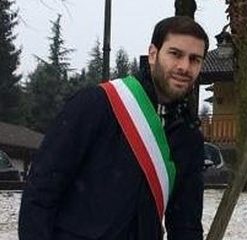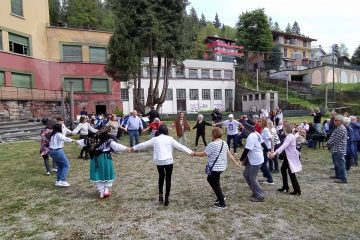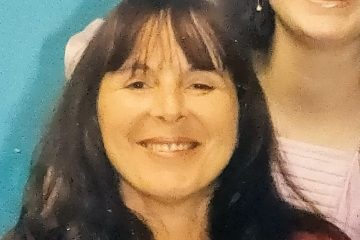Bobbi Maxman (Bronka Auerbach) died suddenly in New York July 7, 2016, at the age of 83 years.
 Bobbi was born in 1932 in Zalosce (Zalosza or Zaliztsi), a small town which was then in Poland.
Bobbi was born in 1932 in Zalosce (Zalosza or Zaliztsi), a small town which was then in Poland.
At the outbreak of World War II, Poland was divided and Zalosce became part of the Soviet Union. Within two years after the war began, the Nazis invaded Poland. The childhood of Bobbi changed forever and her school education ended. After living a short time in the ghetto of Tarnopol, Bobbi’s family hid in a barn behind the house of a Ukrainian who was called “the Hunchback”.
When their hideout was discovered, the whole family with Bronka and brother Avraham Auerbach hid in a Ukrainian forest. For six months they lived in a hole dug in the ground, covered by a board and branches, which filled with water up to their knees when it was raining, and from which you could not see the light of day. They survived on beans that were give to them by a farmer in exchange for money and valuables.
To pass the time, Bobbi and her brother made up games. In one, they divided in half a straw which formed two tracks on which they competed racing lice.
The area was liberated by the Red Army on March 15, 1944, and the family was able to return to Zalosce. But they found that their house had been destroyed by the Nazis and that 99% of the town’s Jews had been treated in the same way. Their father got a job as a clerk under the new regime, but was arrested for some vague charges and then released. Then they decided to run away from the U.S.S.R. and go to Palestine. So began an odyssey that eventually brought them to Italy.
From Tarnopol they went to Silesia and Bielsko. The children stopped about six months in Bielsko, where they stayed in a very crowded house, in pitiful conditions. With the help of “Brichà” they reached Austria through Czechoslovakia and Hungary. They remained some time in Graz and in Vienna, then finally the Jewish Brigade brought them to Italy.
Bobbi’s parents went to a refugee camp in Florence, but there was no place there for children. Therefore Bobbi and her brother Allan (Avraham) went to Selvino, to the Sciesopoli home, where they learned Hebrew and skills useful for eventual emigration to Israel.

After about six months, their parents went to Selvino to retrieve their children, by which time Bronka was fourteen and Avraham was thirteen. But the kids did not want to leave. They insisted: “This is our family.”
So the parents decided to move to Selvino. Their father was a shoemaker and taught his craft to the children of Selvino, while their mother worked in the kitchens.
.
.
.
.
.

Bobbi left Selvino in 1947 and traveled by plane, starting at night near a cemetery near Rome. They landed in an unguarded field in Palestine.
Bobbi was part of the group that founded the Kibbutz Rosh Hanikra, on the Mediterranean coast by the border with Lebanon. She lived in various kibbutzim in northern Israel. In 1948 she fought with the army in the Israel war of independence.
In 1951, Bobbi decided to go to America by ship to visit her parents and her brother Allan, who had been emigrating from Italy in 1949. Bobbi was one of the last immigrants in America who passed through Ellis Island, before this famous entry point was shuttered. Although she had planned to return to Israel, she remained in America where she found work and, at age 20, she returned to school. Previously, she had completed only the second grade and had little knowledge of English.
Her desire for knowledge was rekindled. Bobbi finished high school, she obtained a diploma in Design at the Fashion Institute of Technology, a bachelor’s degree in Russian at Brooklyn College, other degrees at the City University of New York and the Bank Street College of Education, and an Ed.D. at Teachers College of Columbia University. Her learning was not over with formal schooling; because Bobbi remained a student for life. She continued to study and to attend classes, both at Stern College of Yeshiva University, at the Y, and at synagogues and museums.
In 1955, through mutual friends, Bobbi met Al Maxman whom she married in 1956. They had two sons, Joel and Ron. Then they moved to a house near the ocean, in the Manhattan Beach neighborhood of Brooklyn, New York.
Bobbi worked as a designer, as a bookkeeper, as a teacher of foreign language, and then for many years as a special education teacher at a middle school in the East New York section of Brooklyn. After retirement, Al and Bobbi and moved to Manhattan. They were avid theater goers, sometimes attending 4 or 5 performances a week. After retirement they were able to spend more time at their home on Block Island.

During March and April 2016, Bobbi took part in the Children of Selvino, which was held at Kibbutz Tze’elim in Israel. There she found her old friends, including some who had not seen her since 1947 when they had left Sciesopoli.
Bobbi is survived by two sons: Joel and his wife Sherri, and Ron and his wife Helen, and grandchildren Andrew, Elizabeth, Nicole, Sophie and Julia. Until the end, she was full of life and energy.
Bobbi lascia due figli: Joel con la moglie Sherri, e Ron con la moglie Helen e i nipoti Andrea, Elizabeth, Nicole, Sophie e Julia. Fino alla fine è stata piena di vita e di energia.
Some notes on life in Sciesopoli to remember Bobbi Maxman (Bronka Auerbach) drawn from Aharon Megged, (pages 33, 37, 78-79, 148, 151).
 Every day came new children, from the fields, the forests, the monasteries where they had been hidden; They spoke Polish, Yiddish, Hungarian, Romanian, Italian.
Every day came new children, from the fields, the forests, the monasteries where they had been hidden; They spoke Polish, Yiddish, Hungarian, Romanian, Italian.
Moshe Zeiri, Matilde and Reuven Donat welcomed them at the door, made them enter, they talked with each of them, jotted down all of their data in the office.
Moshe gave them Hebrew names: Mila became Emmanuel; Berrik became Dov; Janek became Ya’acov; Romek became Ram; Bronia became Bracha; Andusha became Ayala; Luba became Chaviva.
They accompanied them to the long corridors up to the dormitories, where each one was assigned a bed and a locker, and they said: “This will be your home from now on”.
What little they had brought with them, the few things that still possessed or had gathered in their wanderings, a patched shirt, a pair of socks routes, a penknife, coins, remember, were placed in the lockers. The house, which is accessed by a large curving staircase that led to the entrance, with the brown and ocher facade and green shutters, it appeared to the children like a castle, with shiny marble floors and linoleum, large halls, marble staircases, corridors and maze of rooms where you could lose, the pool, the tiles in the bathrooms, huge pots in the kitchen, large windows, the garden and the woods around it. It was like a fairy tale.
![]()
Màlkale Bronka and her friend, both thirteen, were the “beauties” of the house of Selvino.
When they had to apply the black salve to cure scabies, they decided to spalmarsela all over his body and face, so no one could see them so bad, and they closed in their room all day.
Another day, as they worked in the laundry, it was their desire to be “clean two girls.”
After finishing the laundry filled the tub with hot water and soap, undressed and amused a world wallowing in the foam. Laundry on the roof was a large tube that was used to download the dirty laundry. One of the older boys was found by chance to look into the tube, saw naked girls; and immediately a good number of comrades crowded around to enjoy the show. Moshe Zeiri when he learned of the matter, summoned the two girls, rebuked and told them that because they had done something that absolutely had to do – in the bath cloths and behave as shameless – would have to leave the house. But the girls did not go away. They were told that Moshe was like the father, a stern father, who sometimes dispenses unfair punishment, but the father can not be abandoned.

In the house of Selvino there was an unwritten law, a kind of taboo, so you do not imparted any form of sex education, either on the part of the instructors or by the Dr. Kissin.
The girls who reached puberty and had their first menstruation did not know what to do, and were ashamed to ask the biggest. They were afraid of any physical contact with the boys. Bronka, remembering those days – was then fourteen, recounts: “A Selvino, after years of hunger, we began to grow. Our bodies take shape, protruding breasts. We thought that a big bosom had a kind of deformation, an unnatural growth, and tried to flatten wearing tight bras that would sew alone, to hide it. ”
But ignorance and lack of education were offset by bonds of close friendship and solidarity, dictating rules of behavior born from the environment.
 One day in August 1983, about seventy alumni of Selvino they set out together from Israel to Italy, to visit the place where they had found their childhood more than thirty-five years before, and to inaugurate a memorial plaque.
One day in August 1983, about seventy alumni of Selvino they set out together from Israel to Italy, to visit the place where they had found their childhood more than thirty-five years before, and to inaugurate a memorial plaque.
promoters were two of the first guests to Selvino: Alex Sarel (Olek) and Moshe Barnea (Buchko).
One Friday afternoon, they left by bus from Milan, passed from Bergamo and started down the steep and winding mountain road, towards Selvino.
At the same time he came from Boston Annamaria Torriani, Luigi Gorini widow.
Selvino was no longer a small village. After so many years, he had become a tourist town, crowded with vacationers during the summer months, with hotels, restaurants and shops along the main road. To the east of the city, in some way separate from it, there was the house. His appearance was almost unchanged: the large curved staircase leading to the entrance, a round balcony of the second floor, green shutters, exterior walls painted in white and ocher. Only the sign “Sciesopoli” had been removed, replaced by another because the house had become a wild colony of holidays for children in need of Milan.
Front of the house, the yard, the gate, the thuja, cypress, fir trees, the path that led to the dense grove of pines and oaks. To await the guests were the director of the house, Dr. Baldi, staff, representatives of the Municipality, photographers and journalists of Bergamo and Milan, which had been informed of the event.
When visitors entered the lobby – moved at seeing the place where they had walked, played and studied by children, barely escaped the valley of the shadow of death – there was silence, and for a long moment they all remained motionless.
 Then, suddenly, no one knows how, someone started to sing an old song of the pioneers, and soon everyone took his arm, formed a circle and went on a rampage in a frantic hora, dancing, jumping, singing all the old songs, passing from one in a growing chorus ecstatic. Those who were watching had their eyes full of tears. Annamaria Torriani began to cry on the shoulder of Moshe Zeiri. He could not hold back the tears. Tzippora Hegger – now Levite – whispered to her friends: “I feel all a tingle inside …”. Yannek, Abek, Olek, Indusha, Bronka, Sarka shivered.
Then, suddenly, no one knows how, someone started to sing an old song of the pioneers, and soon everyone took his arm, formed a circle and went on a rampage in a frantic hora, dancing, jumping, singing all the old songs, passing from one in a growing chorus ecstatic. Those who were watching had their eyes full of tears. Annamaria Torriani began to cry on the shoulder of Moshe Zeiri. He could not hold back the tears. Tzippora Hegger – now Levite – whispered to her friends: “I feel all a tingle inside …”. Yannek, Abek, Olek, Indusha, Bronka, Sarka shivered.
Italian women who were working in the house, dressed in white, journalists and photographers, the inhabitants of Selvino were all amazed, taken overall excitement that flowed like electricity from one to another. Some time passed before the journalists were able to take notes and photographers to take pictures. On the wall hung a panel depicting the emblem of the ears, the book and the sickle with the inscription “House of Youth Aliya, Selvino – Italy”, in colorful Hebrew letters, a gift prepared by the town’s children for their Israeli hosts.
Bronka, come from New York, pointed out a surprising phenomenon: “All Children of Selvino had long since married, had children, and none of them had divorced; they were all normal individuals, despite their terrible experiences, and this was the only thing “abnormal” in them, according to the canons of modern Western society”.



